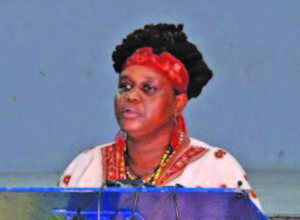Government’s aversion to changing local laws in relation to sentencing of persons found with small quantities of marijuana has not gone unnoticed. In fact, the Society of Marijuana Advocates for Reform and Treatment (SMART) has accused the Government of ‘pussyfooting’ on the issue.
SMART steering committee member Nicole Cole told Guyana Times International on Sunday that Government is not serious about changing the laws, as there had been enough time to get things in order, but there is detected a clear reluctance. She said, “They’re playing Russian Roulette with the local Rastafari community.”

Cole charged that the Coalition had given its word that it would review the Narcotics Law. The Rastafarian community had tied the review of the law to its political votes when the Coalition had promised to do so. She said the APNU is currently pussy-footing and the AFC has a motion before the National Assembly; but, she said, “Even that motion needs to be tweaked further to free Rastafari from Babylon chains!”
For almost three years, the AFC has still not managed to find support from the APNU to support the motion in the name of AFC parliamentarian Michael Carrington to move the first reading of the Narcotics Drug and Psychotropic Substances (Control) (Amendment) Bill. The motion to have the first reading of the Bill was tabled since December 10, 2015. The Bill itself has not been made public.
Former AFC Chairman Nigel Hughes, with the help of Attorney Mark Waldron, had drafted the bill, which seeks to soften the penalties for marijuana possession. That draft bill stipulates that persons who are found in possession of the drug for personal use would be required to pay a fine of G$10,000, or perform community service for a period of time, something that is being widely supported.
Cole recalled the Rastafari community meeting with Attorney General Basil Williams sometime in 2016 to pursue the review of the law. The community has also met with the Caribbean Community (CARICOM) Cannabis Commission which is reviewing the law across the Caribbean. The SMART steering committee member said Guyana should take note of what is happening in other Caribbean territories in relation to this issue, particularly Jamaica and Antigua and Barbuda.
Recently, the Government of Antigua and Barbuda formally apologized before the Organization of American States (OAS) on discrimination against the Rastafarian community, hoping to improve relations with the religious group. The Government there has also committed to enhancing the rights of that minority group, with hope to review local marijuana laws.
Meanwhile, in Jamaica, while marijuana is illegal, possession of small amounts was reduced to a petty offence in 2015. The country has also established a licensing agency to regulate a lawful medical cannabis industry on the island. Cultivation of five or fewer plants on any premises is also permitted in Jamaica, where the drug has long been culturally entrenched, although illegal.
Fight
Given the slow pace at which Government is treating this issue, Cole told this publication that SMART and other Rastafarian groups will not give up, but will continue to fight to ensure that some serious attention is given to that matter, so that Guyana could follow in the footsteps of other countries.
Cole explained that it is Government’s ‘flippant attitude’ that occasioned the recent march by the Rastafari community, calling for their rights to use what they described as the holy sacrament (marijuana) to be recognized. What occurred in 2018 could continue in the coming months, she warned.
“We will never give up the fight to be recognized as a legitimate religious entity, because those rights are enshrined in Art 146 in the Constitution of Guyana, which this Government is denying. We’ve been ostracized, victimized, vilified, and treated as persona non grata by successive Governments because of our use of the holy sacrament. We are the “dregs of society.”
On Thursday, Opposition Leader Bharrat Jagdeo announced his support for custodial sentences for small quantities of marijuana to be removed from the law books in their entirety, but maintained that he is not in favour of the legalisation of marijuana for commercial purposes.
Jagdeo reminded that the People’s Progressive Party (PPP) has made a commitment to support a ‘conscience vote’ should the matter come up for a vote in the National Assembly.
“To send somebody — a young person or even an older person — to jail for less than a quarter ounce of marijuana, for three years, when we have people who are traffickers, and we have people growing large quantities of marijuana, because they have money they get off from the system,” he explained.
The former President said he is not opposed to having them face some penalty, but he would recommend alternative or non-custodial sentencing, such as: community work and rehabilitation. Jagdeo noted that it was not a contentious issue as that of the death penalty, and could be resolved.



